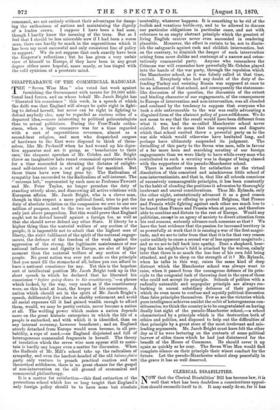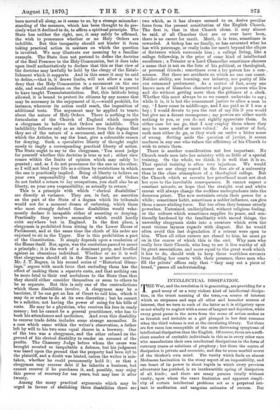CLERICAL DISABILITIES.
VOW that the Clerical Disabilities' Bill has become law, it is 11 well that what has been doubtless a conscientious opposi- tion should reconcile itself to it. It may easily do so, for it has
been moved all along, as it seems to us, by a strange misunder- standing of the measure, which has been thought to do pre- cisely what it declined to do, to affirm a spiritual principle. The State has neither the right, nor, it may safely be affirmed, the wish to pronounce whether or no Holy Orders are indelible. But this incapacity should not hinder it from taking practical action in matters on which the question is involved. We may illustrate our meaning by a familiar example. The State does not pretend to define the doctrine of the Real Presence in the Holy Communion, but it does take upon itself authoritatively to declare that this or that view of the doctrine may lawfully be held by the clergy of the Estab- lishment which it supports. And in this sense it may be said to define,—that is, it draws limits, will not allow a man to deny that the Holy Communion is a sacrament on the one side, and would condemn on the other if he could be proved to have taught Transubstantiation. But, this latitude being allowed, it is bound to protect its citizens by any means that may be necessary in the enjoyment of it,—would prohibit, for instance, wherever its action could reach, the imposition of additional tests. The argument may be applied to tenets about the nature of Holy Orders. There is nothing in the formularies of the Church of England which compels a clergyman to believe that Orders are indelible. This indelibility follows only as an inference from the dogma that they are of the nature of a sacrament, and this is a dogma which the Articles, to say the least, give a colourable reason for denying. Such a speculative liberty of thought ought surely to imply a corresponding practical liberty of action. The State ought to say to the clergyman, You must judge for yourself whether this doctrine is true or not ; either view comes within the limits of opinion which may safely be granted ; and, as I do not pronounce for the one or the other, so I will not bind your life as a citizen by restrictions in which the one is practically implied. Being at liberty to believe on your own responsibility that the obligations of Orders do not forbid a return to lay occupations, you shall also be at liberty, on your own responsibility, so actually to return.'
This is a principle with which "clerical disabilities" are directly at variance. They are, in fact, an assertion on the part of the State of a dogma which its tribunals would not for a moment dream of enforcing, which those who most strongly defend these disabilities would vehe- mently declare it incapable either of asserting or denying. Practically they involve anomalies which could hardly exist anywhere but in England. In the first place, a clergyman is prohibited from sitting in the Lower House of Parliament, and at the same time the chiefs of his order are enjoined to sit in the Upper. Nor is this prohibition a part of the Constitution. It simply depends upon a resolution of the House itself. Nor, again, was the resolution passed to assert a principle ; it is the work of a dominant party, and levelled against an obnoxious individual. Whether or no it is well that clergymen should sit in the House is another matter. Mr. J. T. Rogers, in his second series of "Historical Glean- ings," argues with much force that excluding them has the effect of making them a separate caste, and that nothing can be more fatal to their real usefulness to the State than that they should either consider themselves or seem to others to be so separate. But this is only one of the contradictions which these disabilities involve. A clergyman may be a barrister, if he can get an Inn of Court to call him, which it may do or refuse to do at its own discretion ; but he cannot be a solicitor, not having the power of suing for his bills of costs. He may be a physician, who receives his fees in ready money ; but he cannot be a general practitioner, who has to book his attendances and medicines. And even this disability to recover trade debts includes some strange anomalies. In a case which came within the writer's observation, a father left by will to his two sons equal shares in a brewery. One of the two was a clergyman, and the other refused on the ground of his clerical disability to render an account of the profits. The Chancery Judge before whom the cause was brought scouted so inequitable a defence, but his judgment was based upon the ground that the property had been left to the plamtiff, and a doubt was hinted, unless the writer is mis-
taken, whether he could permanently hold it ; so that a clergyman may .recover debt if he inherits a business, but cannot recover if he purchases it, and, possibly, may enjoy this power of recovery for ten years, but may lose it after twenty.
Among the many practical arguments which may be urged in favour of abolishing these disabilities there are two which, as it has always seemed to us, derive peculiar force from the present constitution of the English Church. The first is, that in that Church alone, it may almost be said, of all Churches that are or ever have been, there is no career for merit. Merit, it is true, sometimes is rewarded. A bishop has no family, or has saturated what he has with patronage, or really looks for merit beyond the clique of flatterers which surrounds him ; a college living, like a college fellowship, is the prize of some kind of intellectual excellence ; a Premier or a Lord Chancellor sometimes chooses a name that is not on the lists of his political, or theological, or personal friends ; sometimes even a lay patron has a con-, science. But these are accidents on which no one can count. Neither ability, nor learning, nor industry, nor purity of life can command preferment. As a matter of fact, every one knows men of blameless character and great powers who live and die without getting more than the pittance of a clerk. Whether this must always be so we cannot undertake to say ; while it is, it is but the commonest justice to allow a man to say, I have come to middle-age, and I am paid as if I was a boy ; I would devote to you the rest of my life if you would but give me a decent recompense ; my powers are either worth nothing to you, or you do not rightly appreciate them. In either ease let me go, that I may employ them where they may be more useful or more valued.' As a matter of fact, such men either do go, or they work on under a bitter sense of wrong. Setting aside the question of justice, it seems madness in any one who values the efficiency of his Church to wish to retain them.
There is another consideration not less important. No Church sends men into her ministry with so little of a special training. On the whole, we think, it is well that it is so. That special training is often very injurious. We would sooner see our clergy reared in the free air of a university than in the close atmosphere of a theological college. Bat the Church which so recruits her priesthood must not shut her eyes to the inevitable consequences. It cannot expect a constant miracle, or hope that the straight coat and white cravat will always change the reckless undergraduate into the decorous priest. The new restraints retain their power for a while; sometimes habit, sometimes a nobler influence, can give them a more abiding force. But too often they become utterly powerless. Untrained, undisciplined, without religious feeling, or the culture which sometimes supplies its peace, and con- tinually hardened by the familiarity with sacred things, the unworthy clergyman sinks into a creature which even the most vicious layman regards with disgust. But he would often avoid this last degradation if a retreat were open to him. When all other careers are closed to him, he must go on in the course of which this is the end. Why men who really love their Church, who long to see it live worthy of all its great associations, and more equal to the great work which it has to do, should wish to keep these worthless servants from defiling her courts with their presence, these men who fill the priests' offices only that "they may eat a piece of bread," passes all understanding.































 Previous page
Previous page